
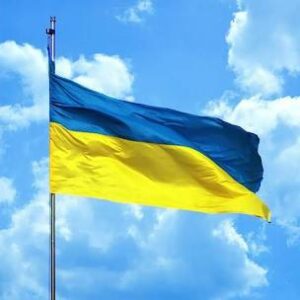
Pray for the people of Ukraine and Gaza.
_________________
If you have not read last week’s Post, you really should. Never begin anything in the middle. (Easy access is at the bottom of this Post.)
However, for those of you who have read Part One but can’t remember anything about it:
A Quick Reprise
In what I’m writing here I do not intend to disparage any Christian’s sincerity or love for the Lord. I’m only describing my search and why I landed where I did.
I told the story of how I wound up in a Methodist seminary, where they expected us seminarians to go out and serve little country churches on weekends, to pastor, preach and teach. But nobody told us what we should preach and teach. I was new to religious faith and had gone into seminary thinking religion was simple. Wrong! Among professors and seminarians in the same denomination, there was a multitude of different teachings. Besides, I was growing and kept changing my own mind! So I was supposed to go out and lay my personal opinions-of-the-moment on people, as if they were the Gospel Truth? No way! I refused to take a church.
That led me to the search: I thought surely there must be some higher authority to guide us. But what? I was reading many books from many sources. That takes us up to today’s episode.
______________
My Search for the Church
I discovered that Roman Catholics, Eastern Orthodox and most Anglicans kept saying “The Church teaches…[this ], the Church says…[that ]. I had no idea what that meant. As I said, “Church”, as I had experienced it, was a bunch of competing denominations and doctrines.
Finally I grasped the concept: The Church of Jesus Christ had been entrusted by Jesus Christ with the Truth of Jesus Christ, to pass it on from generation to generation.
But… which was the right Church? I was looking now not for “a church” which allowed me to believe what I want to, but “The Church” which stands firm in the Faith, which would guide me and form me.
Characteristics of the Church
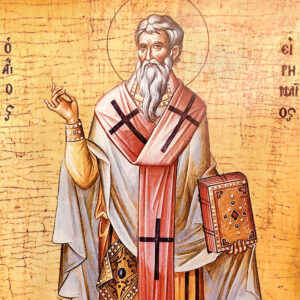
I discovered the book Against Heresies, by Saint Irenaeus, Bishop of Lyon * (born AD 130). Iranaeus had been ordained by Saint Polycarp of Smyrna (born AD 69, died AD 155), who was a disciple of Saint John the Theologian, (died AD 99) who had been the Apostle closest to Our Lord Jesus Christ. Note how their lives overlapped. Saint Irenaeus had been taught by someone who knew the Apostle John. What Saint Ireneaus wrote surely was bound to be on the mark. (I discovered later that even earlier post-Apostolic writings confirmed what he said.)
- Lyon is 250 miles south of Paris. Travel time today is less than two hours on the TGV train, at about 125-130 miles/hour. Travel time in Saint Irenaeus’ day was eight to ten days if the weather was good, by horse and cart on the Roman Road. (I just thought I’d throw that in.)
Back to the subject:
Like us, Saint Irenaeus was dealing with many “denominations” (as we call them), all teaching different things about Christ and Christianity. The question was: Was there a True Church, the Church that knew the Truth about Jesus Christ?
He listed two characteristics:
1 The Church has Apostolic Succession of Bishops who guarantee the authentic Faith.
“It is within the power of all, therefore, in every Church, who may wish to see the truth, to contemplate clearly the tradition of the apostles manifested throughout the whole world; and we are in a position to reckon up those who were by the apostles instituted bishops in the Churches, and [to demonstrate] the succession of these men to our own times; those who neither taught nor knew of anything like what these [heretics] rave about.” Book III, Chapter 3
Note carefully: This Apostolic Succession, generation after generation, consists of 1) continuity of Ordinations of Bishops, and also 2) continuity in The Apostolic Faith. Both are necessary. Both function together.
Irenaeus said that Christians in Lyon were under the authority of the Bishop of Rome, the Pope, whose succession could be traced back directly to the Apostle Peter.
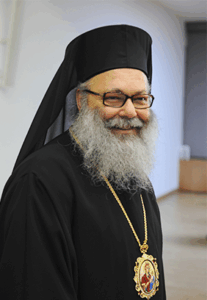
As I came to discover, in the East there were other churches who shared a similar Apostolic Succession. The Church in Antioch, for example, also traced its succession back to Saint Peter. The current Patriarch of Antioch, John X, under whom I serve, is the 169th successor to the Apostle Peter. Here’s the list: https://orthodoxwiki.org/List_of_Patriarchs_of_Antioch
2 The Church is completely united in the Faith.
“As I have already observed, the Church, having received this preaching and this faith, although scattered throughout the whole world, yet, as if occupying but one house, carefully preserves it. She also believes these points of doctrine just as if she had but one soul, and one and the same heart, and she proclaims them, and teaches them, and hands them down, with perfect harmony, as if she possessed only one mouth… …For the Churches which have been planted in Germany do not believe or hand down anything different, nor do those in Spain, nor those in Gaul, nor those in the East, nor those in Egypt, nor those in Libya, nor those which have been established in the central regions of the world.” Book I, Chapter 10
Narrowing it down
Apostolic Succession (in its outward form, at least) existed only among Roman Catholics, Eastern Orthodox and Anglicans.
Regarding complete unity in the Faith, I couldn’t imagine there was anything like left that on earth. However, there were at least churches who said the Creed.
In addition, I discovered that historic Christianity had liturgical worship and the sacraments, including the Eucharist every Sunday.
It was obvious I was in the wrong place.
But which was the right place?
Methodism had sprung from Anglicanism, so that seemed the reasonable place to check out first. Anglicans had divisions: Anglo-Catholic, Evangelical, Modernist. However, all said the Creed, they had the sacraments, and their worship was liturgical.
I took a close look at the Roman Catholic Church. They seemed to be united in doctrine and practice *, but such doctrines! In order to be saved, you had to believe in Papal Infallibility, and the Immaculate Conception and Bodily Assumption of Mary. Where did all that come from? Also I had personal considerations: I felt strong inner callings both to be ordained and to be married and have a family. Also, if I went RC, it would have about killed my dad – and our relationship. I knew Jesus told us if we had to choose between Him and family, we must choose Him – but He said nothing about choosing between family and the Pope.

- At the time I think they were united. However, a decade or two later they would not be. I heard a Roman (I won’t call him Catholic) theologian publicly deny the divinity of Christ. I saw for myself a “Rock Mass” (opening song: “For God, love, rock and roll!”), and a “Comedy Club Wedding”. Then there was the “Clown Mass”. I knew of a community of “Catholic” nuns here in Milwaukee who worshiped “Geia”, Mother Earth. These things were very unusual. My point is they were tolerated. There was disunity.
I read more about the Orthodox Church and concluded by process of elimination that the Orthodox were closest to getting it right. * So I went to visit Orthodox churches. Κύριε ἐλέησον. Everything (I mean everything including the announcements) was in Greek or Slavonic or whatever. I said to myself, “You’ve got to be born into that.”
- I know how bizarre this must sound to you “cradle Orthodox”, but we non-Orthodox had to figure this out on our own.
Then by chance (or was it?), in the depths of the seminary library, I came across a book * by one Professor Hodges of the Church of England, who argued that the vocation of Anglicanism was to become “Western Orthodoxy”. The solution?
- I’ve forgotten the title.
Anglicanism
I did not accept Anglicanism as second best.
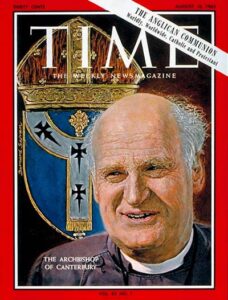
The powerful Anglo-Catholic movement was at its height, and the Episcopal Diocese of Chicago, where I was living, was Anglo-Catholic. There was Scriptural and Creedal teaching and preaching, beautiful liturgical Eucharistic worship on Sundays and daily Mass in many places, serious prayer and devotion, the Blessed Virgin Mary and the saints, Confession, fasting, vestments, monasteries and convents – and incense! It was a whole new and exciting world to me. Anglo-Catholics believed all of Anglicanism would soon follow along, recovering the ancient Tradition which had been stolen from them. Western Orthodoxy!
Archbishop of Canterbury Arthur Michael Ramsey had been greatly influencd by Orthodoxy. His teaching (except for his ecclesiology *) was Orthodox. I heard him speak at Northwestern University to a packed hall. He even appeared on the cover of Time magazine.
- Anglo-Catholics believed the Church existed in three branches: Roman Catholic, Orthodox and Anglican.
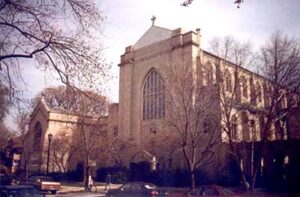
The Episcopal Diocese of Chicago was almost solidly Anglo-Catholic. I found a prominent Anglo-Catholic parish, and in 1963 I made my first Confession (in an old-fashioned confessional booth, no less) and was confirmed into the Episcopal Church.
I had found “The Church”.
In my parish I also found some “moral discrepancies”, shall we say? which I assumed were unusual.
After a year and a half, the Episcopal Bishop of Chicago sent me to The General Theological Seminary of the Episcopal Church in New York City. I should have caught on from the beginning. The basics were still there. We had daily Mass and the Offices. Most professors  taught it straight, but a couple of them encouraged “strange doctrines”. A friend told me he believed in the Virgin Birth only during December! Most seminarians were committed to various theological and liturgical “parties”. (We pigeon-holed people by their ceremonies at worship: “Oh, he’s a high church Catholic. He’s a moderate Catholic. He’s a low church Evangelical” and so on.) I discovered that the “moral discrepancies” which affected my home parish were far from rare. The renegade Bishop Pike, dressed in traditional cope and mitre, celebrated Noon Mass at Trinity Church, Wall Street, said the Creed and then preached that the doctrine of the Holy Trinity should be junked. Nothing was done to stop him, and soon there were others like him.
taught it straight, but a couple of them encouraged “strange doctrines”. A friend told me he believed in the Virgin Birth only during December! Most seminarians were committed to various theological and liturgical “parties”. (We pigeon-holed people by their ceremonies at worship: “Oh, he’s a high church Catholic. He’s a moderate Catholic. He’s a low church Evangelical” and so on.) I discovered that the “moral discrepancies” which affected my home parish were far from rare. The renegade Bishop Pike, dressed in traditional cope and mitre, celebrated Noon Mass at Trinity Church, Wall Street, said the Creed and then preached that the doctrine of the Holy Trinity should be junked. Nothing was done to stop him, and soon there were others like him.
So we graduated, and I headed back to Anglo-Catholic Illinois, where everything was “safe”. There were still many “Catholic” bishops and dioceses in the Episcopal Church. A very peculiar ecclesiology, you say? But where else was there to go? I still was fascinated by Orthodoxy and visited Orthodox churches when I could. It still seemed inaccessible.
That lasted for 24 years.
In my first parish I was a curate (assistant), the first one, forced on a senile, paranoid, drunken pastor. It would take too long to tell you about that! In my second parish (an excellent place) I was one of two curates. There I met and married my dear wife.
My third church in the Anglo-Catholic Diocese of Milwaukee was a mess when we arrived, but we built it into a flourishing Catholic parish *, while the Episcopal Church – bishop by bishop, diocese by diocese, priest by priest, parish by parish – proceeded to go “down the tubes”. It got to the point where most new people who came to my church had to be instructed in the Faith almost from scratch. Then we got a new bishop and with him a bunch of clergy who wanted only to “follow the pack”.
- As became clear after I left, it was only superficial.
For about ten years I had been editor of a national newspaper (small circulation, but a whole lot larger than this one!) for a group which was trying to recover “traditional Anglicanism”. We were failing. About that time, an equally disgruntled bishop told me he had concluded that Anglicanism isn’t a church – it’s series of successive movements: Evangelical, then “Catholic”, then liberal, and so on and on.
After one Deanery clergy meeting, I came home sure I no longer had a home. I gave up. Anglicanism had never been what I thought. “Western Orthodoxy”? – not a chance.
Don’t misunderstand: There are many fine people in the Episcopal Church (and in all the Christian denominations) – people who love Jesus and love their neighbors and do much good in this world. God bless them.
But Anglo-Catholicism, which drew me in, survives in only a few places. The parish where I was confirmed has a female rector (pastor) and is almost unrecognizable today. At the church where my wife and I were married, the present male rector has a husband. A new female bishop in England celebrates Geia worship. Enough… But perhaps I should add that membership in the Episcopal Church today is about half what it was in 1965 when I was ordained.
As I write this, I am still homesick for what once was. I still grieve for what has been lost.
However, many years ago in the Episcopal Church, I learned The Faith.
I learned how to pray. I came to love our Blessed Mother Mary and to pray for the departed * and to ask saints for their intercession. And in its worship, I saw “the fair beauty of the Lord” (Psalm 27:4), the glory and splendor of God. So many things that I still treasure today. I will always be grateful.
- My father died while I was in seminary. If I could not have prayed for him, I think I would have lost my mind.
The Orthodox Church
The whole truth was this: I also had been changing. As Anglicanism went one way, I had been heading in another. I had been reading some of the Fathers and about Orthodoxy. I was discovering there was more to The Church than I had thought. I was again visiting Orthodox churches. I discovered that English language Orthodoxy was now available., and so quickly a vast amount of superb English-language Orthodox literature had appeared. Orthodoxy had become accessible.

I was invited to an Orthodox clergy conference where Father Thomas Hopko * took an hour to talk with me. He told me that in the Orthodox Church there is “absolute theological unanimity”.
- “May his memory be eternal.” God rest that good man.
Father Tom showed me, for the first time, the Church which Saint Irenaeus described.
I didn’t quite believe what he said at the time. But it’s true. While I was inquiring, I asked a Greek Orthodox priest: “What’s the difference between you and the Russians?” (I still feared Orthodoxy was like Protestantism: different Orthodox “denominations”, different teachings.) He showed me a Liturgy book and said, “At the beginning of the Liturgy, they usually sing those Antiphons; we usually use these.” ”What else?” I asked. “That’s about it”, he responded.
Yes. That’s about it. It really is different here. Maybe there are a few heretics lurking behind the pillars, but in my 35 years here I have never come across one. I have never heard an Orthodox bishop or priest teach anything but the Faith. I have never heard an Orthodox layperson deny the Faith.
Are all Orthodox people deeply into it? Of course not. That couldn’t be expected in a Church that’s been around for 2000 years. The Orthodox Church certainly has at least our share of sinners and crazies, and a multitude of other problems, not least the present division caused by the Patriarch of Moscow. We’re made up of human beings. But that’s a different issue.
The Faith is established here. Our bishops don’t have to defend and guard the Faith. As an Orthodox priest once told me, “Our people just know who they are”.
I found what I was searching for: The true and authentic Church, solidly “built upon the foundation of the apostles and prophets, Jesus Christ Himself being the chief cornerstone.” Ephesians 2:20
So how did I finally become Orthodox?
Well… … … My Episcopal bishop kicked me out for promoting Orthodoxy – to be precise, he gave me a choice between an ecclesiastical trial and resignation. Thank God for that man! Otherwise, would I have had the guts to make the leap? I don’t know. All that is another story.
How has being Orthodox affected me personally?
As an Anglican we were forever trying to reshape the “Church” to make it what we thought it should be. I had become negative, dispirited. A woman from my parish told me, “I just wish we could get the old Father Bill back”.
Here the Church shapes me in the Faith. For the past 35 years I have been positive-minded, “upbeat”. Some years later I happened to meet the same woman. I told her “The old Father Bill is back.”
Next Week and the following Week: Summer! Time to go traveling! and since I can no longer manage that, I’m going to do it by Blog. We’ll start all over again with My first trip to Greece and how Saint Nicholas got moving in my life. I hope you can come along.
great job Fr Bill,!
I shared this with all my youth workers today!
in ICXC
Fr Bill Gikas
Wyckoff NJ
One of the loves I have for Orthodoxy was presented in the intimate and detailed essay. Thank you, Good Father.